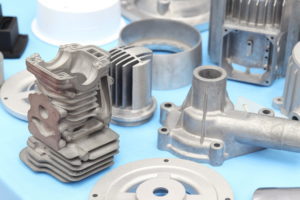Stahl Specialty Company Things To Know Before You Get This
Stahl Specialty Company Things To Know Before You Get This
Blog Article
Getting My Stahl Specialty Company To Work
Table of ContentsLittle Known Facts About Stahl Specialty Company.Stahl Specialty Company Can Be Fun For EveryoneStahl Specialty Company Fundamentals ExplainedMore About Stahl Specialty CompanyNot known Factual Statements About Stahl Specialty Company
The subtle difference exists in the chemical content. Chemical Contrast of Cast Light weight aluminum Alloys Silicon promotes castability by reducing the alloy's melting temperature and boosting fluidness during casting. It plays an important role in permitting complex mold and mildews to be loaded properly. Additionally, silicon adds to the alloy's toughness and wear resistance, making it beneficial in applications where resilience is essential, such as vehicle components and engine components.It also boosts the machinability of the alloy, making it simpler to refine into finished products. In this method, iron adds to the overall workability of light weight aluminum alloys. Copper increases electric conductivity, making it advantageous in electrical applications. It likewise enhances corrosion resistance and includes to the alloy's overall strength.
Manganese adds to the strength of aluminum alloys and boosts workability. It is frequently utilized in functioned light weight aluminum products like sheets, extrusions, and profiles. The presence of manganese help in the alloy's formability and resistance to breaking during fabrication procedures. Magnesium is a lightweight component that offers stamina and effect resistance to aluminum alloys.
Zinc enhances the castability of light weight aluminum alloys and assists regulate the solidification procedure throughout spreading. It enhances the alloy's strength and hardness.
The Buzz on Stahl Specialty Company
Because aluminum-silicon alloys have excellent casting buildings, high gas homes, basic procedures, and exceptional rust resistance, aluminum-silicon alloys are most frequently used in the die-casting industry in the house and abroad. At the same time, aluminum-silicon alloys are also reasonably early and widely recognized alloys developed and utilized in die-casting. After continual research study and renovation, many of the present international mainstream aluminum-silicon alloys have been settled and are absolutely nothing more than A356, A360, A380, ADC12, B390, and A413.
The primary thermal conductivity, tensile toughness, return strength, and prolongation vary. Among the above alloys, A356 has the highest possible thermal conductivity, and A380 and ADC12 have the least expensive.

The Single Strategy To Use For Stahl Specialty Company
In precision spreading, 6063 is appropriate for applications where complex geometries and high-grade surface area finishes are critical. Examples include telecommunication units, where the alloy's exceptional formability permits sleek and visually pleasing layouts while maintaining architectural honesty. In a similar way, in the Lights Solutions sector, precision-cast 6063 components develop elegant and reliable lights components that call for elaborate shapes and great thermal performance.
(https://dzone.com/users/5301552/stahlspecialc.html)
It leads to a finer surface area coating and better rust resistance in A360. The A360 exhibits premium elongation, making it optimal for facility and thin-walled elements. moved here In accuracy spreading applications, A360 is well-suited for sectors such as Consumer Electronics, Telecommunication, and Power Devices. Aluminum Casting. Its enhanced fluidity permits intricate, high-precision parts like smartphone casings and communication device housings.

In accuracy spreading, aluminum 413 beams in the Consumer Electronic Devices and Power Equipment industries. This alloy's remarkable corrosion resistance makes it an excellent selection for outdoor applications, making certain resilient, long lasting products in the pointed out markets.
Getting My Stahl Specialty Company To Work
The light weight aluminum alloy you choose will significantly influence both the spreading process and the properties of the final product. Due to the fact that of this, you must make your decision meticulously and take an educated method.
Establishing the most suitable aluminum alloy for your application will mean weighing a wide variety of qualities. The initial group addresses alloy characteristics that affect the manufacturing procedure.
The alloy you choose for die casting directly impacts numerous aspects of the spreading process, like just how easy the alloy is to collaborate with and if it is prone to casting issues. Hot splitting, additionally called solidification splitting, is a regular die casting flaw for light weight aluminum alloys that can result in inner or surface-level rips or fractures.
How Stahl Specialty Company can Save You Time, Stress, and Money.
Particular aluminum alloys are much more at risk to hot splitting than others, and your choice needs to consider this. Another usual issue located in the die spreading of aluminum is pass away soldering, which is when the cast adheres to the die walls and makes ejection hard. It can damage both the cast and the die, so you must look for alloys with high anti-soldering residential or commercial properties.
Deterioration resistance, which is currently a notable characteristic of light weight aluminum, can differ considerably from alloy to alloy and is an important characteristic to take into consideration relying on the environmental conditions your product will certainly be subjected to. Use resistance is one more home typically sought in light weight aluminum items and can separate some alloys.
Report this page